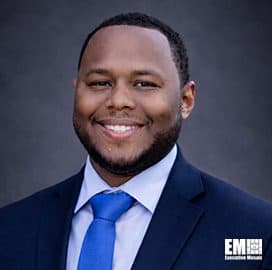
Member Profile: Jamie Burkhardt
For the better part of the last decade, Jamie Burkhardt has led business efforts with budgets nearing a billion dollars for IT, information assurance, cybersecurity, software and more at McLean, Virginia-based contractor Agile Defense. He came into his current role as vice president of defense operations and general manager of Navy, Marine Corps and combatant command business in Jan. 2024. Before Agile, Burkhardt led a decades-long public sector and military career that included time as chief engineer at the Navy, director of the IT Program Management Office for U.S. Transportation Command and military assistant to the deputy under secretary of defense at the Pentagon.
Upon joining Potomac Officers Club recently, Burkhardt shared insights about his management style, background and thoughts on emerging technologies. Welcome to POC, Jamie!
Potomac Officers Club: What can you tell us about your background and how you’ve been able to adapt to the ever-changing challenges of the federal landscape over the course of your career?
Jamie Burkhardt: I spent over 20 years in the U.S. Navy in both operational and strategic roles before transitioning to industry. That background gave me an appreciation for both the mission demands of the warfighter and the complexity of the federal enterprise. Adaptability has been essential—whether leading sailors aboard warships or driving IT transformation across the DOD, success depends on understanding the environment, anticipating change and empowering teams to respond with speed and precision. At Agile Defense, I focus on helping our teams deliver resilient IT, cyber and data solutions that keep pace with an evolving federal landscape.
POC: What do you believe are your core strengths as a leader and what lessons taught you the most about driving success?
Burkhardt: I believe my core strengths are adaptability, customer intimacy and building strong teams. Early in my Navy career, I learned that no plan survives first contact—leaders have to adapt quickly and keep their people focused on outcomes. Later, working in the Pentagon and now in industry, I saw the power of relationships and trust in driving success. Finally, I’ve learned that investing in people is the single most important factor—leaders succeed when their teams succeed.
POC: If your career came to an end tomorrow, what would you say have been the most significant accomplishments of your career? Where do you feel you made the most impact?
Burkhardt: In uniform, I’m most proud of leading sailors at sea and ensuring they returned home safely after complex operations. In industry, I’m proud of helping Agile Defense grow from a small business into a trusted partner delivering mission-critical IT across the services and combatant commands. The most impact I’ve had has been in building leaders. Whether in the military or at Agile Defense, seeing people I’ve mentored take on larger responsibilities and succeed is the greatest accomplishment.
POC: How would you describe your management style and core values towards building a winning culture?
Burkhardt: My management style is collaborative but accountable. I set a clear vision, give people the tools and trust to execute, and expect transparency and ownership in return. The core values I emphasize are integrity, teamwork and resilience. In GovCon, challenges are inevitable (budgets shift, missions change) but teams grounded in those values will adapt and thrive.
POC: With emerging technology influencing the federal government and industry more by the day, what are some of the challenges on the business side of innovation that aren’t always discussed as often as they should be?
Burkhardt: One challenge is the speed mismatch. Technology is evolving faster than acquisition and security processes can adapt. Another is talent: advanced data, AI and cyber capabilities require specialized skills, and recruiting and retaining that talent in a competitive market is a constant challenge. Finally, integration is often overlooked—innovation isn’t just about deploying new tools, it’s about integrating them into mission workflows in a way that’s sustainable and secure.

Category: Executive Profiles




